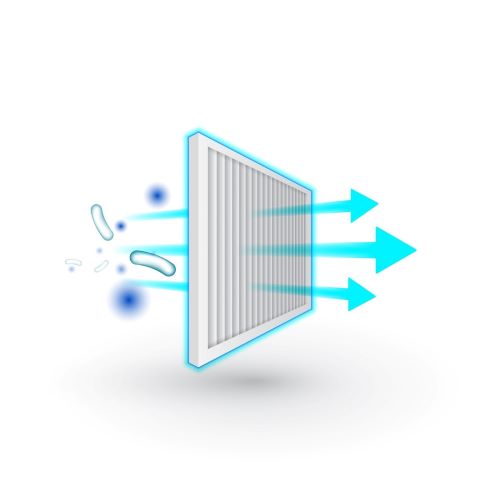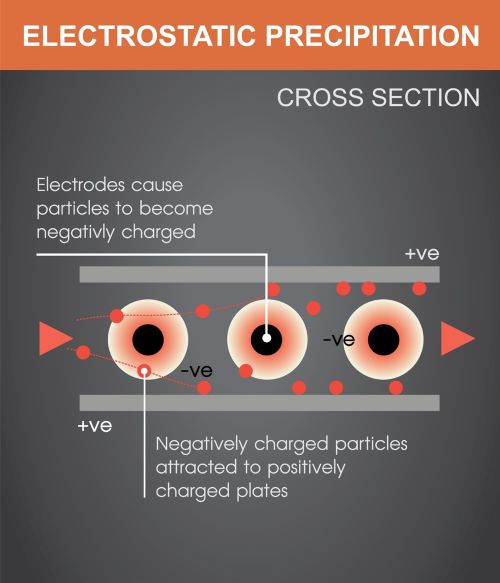Ionic Air Purifier vs. HEPA Air Purifier Systems
Both HEPA and ionic air purification systems are commonly used to improve indoor air quality. However, they go about this in completely different ways, which affect the impact they have on your home or business.
At Air Health, we want you and your loved ones to breathe the cleanest air possible. Our guide to ionic air purifier vs. HEPA filter systems explains how they work and when to consider using each one.
How HEPA Purifiers Work
EPA filters, which were developed during World War II by the U.S.
military, are the most common type of air purifier

in use today. The air purifier uses a fan to continually draw air into the unit and force it through a fine-mesh filter. After the filter traps harmful particles and contaminants, clean air is pushed back into the room. The highest-rated HEPA filters can capture 99.97% of dust, pollen, smoke, pet dander and many other impurities as small as 0.3 microns — smaller than what can be seen with the naked eye. HEPA air purifiers are great for reduces symptoms associated with common allergies and other respiratory conditions.
How Ionic Air Purifiers Work

Ionic purifiers are a modern creation that don’t require traditional filters. Instead, they release negatively charged ions, which bind to positively charged air pollutants as small as 0.1 microns and make them too heavy to stay airborne. There are two primary types of ionic purifiers:
- Air Ionizers send negatively charged ions into the room’s surrounding air, causing contaminants to fall and settle onto nearby surfaces (floors, tables, carpets, etc.), where you can then wipe them up.
- Electrostatic Precipitators have positively and negatively charged plates. A fan draws the pollutants through the plates, which collect the particles so they can be cleaned off.
Pros & Cons of HEPA Filter vs. Ionic Purifier Systems
HEPA Filter Pros:
- Excellent at capturing large and fine particles and preventing them from re-entering the air.
- Certified to capture 99.97% of 0.3 microns. Particles that are greater than .3 microns include mold, mildew, bacteria, viruses.
- Proven to help reduce symptoms of allergies, asthma and other respiratory conditions.
- Doesn’t add any byproducts to the air.
- Commonly available for many filtration systems.
HEPA Filter Cons:
- HEPA filters are not certified to capture particles below 0.3microns, small particles in the air like viruses and bacteria.
- HEPA filters are not capable of capturing chemicals, gases, and volatile organic compounds (such as ammonia and formaldehyde). PRO-Cell technology is a good solution for these types of gases.
- Filters can be expensive and should be replaced after a period of to ensure they continue to be effective. There are no cleanable HEPA filters.
- Mold and bacteria can grow on HEPA filters, especially when they get dirty. UVC light is a good source for removing these from the HEPA filter.
Ionic Purifier Pros:
- There are some results that indicate that ion technology can be effective at deactivating viruses, bacteria when emitted at a high enough dosage.
- Inexpensive, quiet and compact compared to other purifier systems.
- Possible to clean
- Can cover a larger area (but not at a high enough dosage to be effective)
Ionic Purifier Cons:
- Ionic purifiers are filter-less, and therefore do not remove the particulates effectively, especially the smallest, most dangerous particles
- Performs much worse when compared to a HEPA filter, and performance degrades as the plates become dirty.
- It is common for ozone to be produced as a by-product of ionization, and Ozone is considered indoor air pollution and a lung irritant
- Make surfaces around the ionizer dusty.
- Settled contaminants can easily be re-released into the air by walking through a room or touching a surface (or if the electrostatic plates are left dirty).
- Charges particles so they attach to surfaces in the space, which could be the carpeting, walls, your clothes and worst case - your lungs. You do not want mold spores sticking to the wall or your lungs.
- Air ionizers are not recommended for relief from allergies or any other respiratory condition
Which Air Purifier Should I Use?
An ionic purifier is a good low-cost solution for general air cleaning, especially if viruses and VOCs are a concern. However, for those who have respiratory conditions or concerns, a HEPA purifier will provide maximum effectiveness. Air Health offers many solutions, including the SKYE Air Purifier with a HEPA filter and UVC light, to give your family clean indoor air and peace of mind.
 US Dollars
US Dollars
